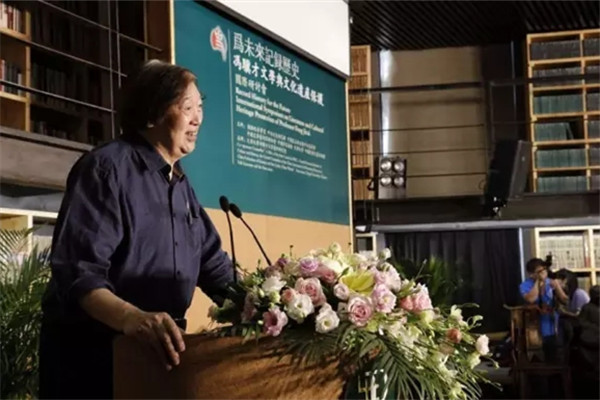On the morning of Sep 19th, Feng Jicai Institute of Literature and Art held an opening ceremony for his latest literature and culture heritage protection symposium: “Record history for the future”.
People from literature, art, and heritage protection circles from all over the world came to participate the symposium.

During the opening ceremony, Tie Ning, the president of China Writers Association and China Federation of Literature and Art Circles, expressed her congratulations to Feng Jicai. “Friends from literary and art circles always call him ‘Big Feng’ because he is tall, and I also want to express that his life and career are vast indeed.” She continued, “Not only is he a famous writer but he is also a painter with a unique and special style. Moreover, he is a stubborn protector of cultural heritage. While he was tired and busy in the past, he has devoted himself to research and promoting cultural heritage protection to the public.”
Feng has a strong sense of responsibility towards our culture, our traditions and our public life. He has inspired more and more people through his practice and promotional work. His action has deeply improved society’s awareness of cultural heritage protection.
Liu Wei, a well-known Peking Opera performer, showed episodes of an opera edited by Feng’s work of “Three-inch ‘golden lotuses’”. Han Meilin, a member of Standing Committee of the CPPCC, as well as well-known artist, sent Feng his sculpture “Bear”.
Han said: “We have to fight for humanity and struggle for the dignity of life on earth. In this respect, the writers and artists have an unshakable duty, influenced by Feng’s cultural protection.” German painter Ekkehard created a series of works based on the historic Tianjin city and he sent Feng his picture “Confucius Temple in the City of Tianjin”.
Feng delivered a speech during the symposium: “I am a man who crosses circles, and I am 75 years old. I hope I can summarize my work through this activity and the following symposium. All the specialists and scholars gathered here can help me to think. You are my mirrors, and cultural protection needs us to do it together. I still think I won’t give up on this cause until the end of my life.”
In the opening ceremony, the Writers Publishing House awarded Feng a prize for his work “Mundane World Phenomenon”, which has sold over two million copies.
Feng Jicai is one of the most important writers in Chinese modern literature. His works, “God Whip”, “The tall woman and her short husband”, “Three-inch ‘Golden lotuses’” and “A hundred people’s ten year periods”, have left an indelible mark on Chinese modern literature history. His famous essays “Heaver on the mountain” and “Pearl bird” have been elected for primary and secondary school textbooks. The above works have influenced people’s hearts and souls across several generations. As well as novels, essays, Chinese modern proses and travel journals, Feng also writes theater and dramas, poems and audiobooks, with his output totaling millions of characters.
Feng achieved great success in literature, and meanwhile exerted a profound influence on cultural heritage protection. His awareness, understanding, judgement and his thinking, action, and promotion work propelled him to become one of the most notable scholars in modern society. His Chinese folk culture heritage protection project has investigated and catalogued innumerable examples of intangible cultural heritage over the past thirteen years.
The symposium will last two days, with over fifty scholars from around the world coming together in Tianjin. They plan to discuss topics focused on literature and cultural heritage protection relating to Feng Jicai. They intend to expand the conversation and resolve important issues regarding modern literary and cultural areas.
The symposium is co-sponsored by The State Council, Central Literature Research Center, Central Committee of China Democratic Promotion Association, Chinese Federation Of Literary And Art Circles, Chinese Writers Association, Tianjin University, Chinese Folk Artists Association, and will be undertaken by Feng Jicai’s literature and art research institute based at Tianjin University.
By: Ci Maxiang
Editors: Qin Mian and Christopher Peter Clarke






